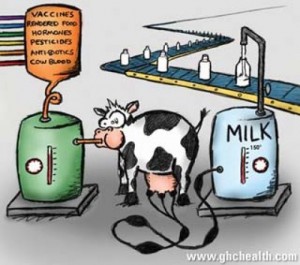 Cray cray for calcium? Indeed! The dairy industry has brilliantly distorted the idea that the more of its products you consume, the better off your bones will be for the long haul. If only it were that simple….
Cray cray for calcium? Indeed! The dairy industry has brilliantly distorted the idea that the more of its products you consume, the better off your bones will be for the long haul. If only it were that simple….
Dairy products do indeed deliver a dose of calcium and fortified vitamin D, but that is not the end-all, be-all of healthy bone metabolism. Bone health is complex and multifactorial, incorporating genetics, gender, age, and lifestyle factors such as exercise and overall dietary intake. A plethora of nutrients 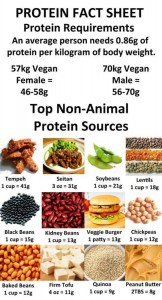 play powerful roles and work synergistically to keep bone mineralization functioning in a healthy way. In addition to calcium and vitamin D, other crucial characters include protein, potassium, phosphorus, magnesium, zinc, copper, manganese, soy isoflavones, and vitamins B12, C, and K. As it turns out, the nutrients found in plants can more than meet your daily requirements.
play powerful roles and work synergistically to keep bone mineralization functioning in a healthy way. In addition to calcium and vitamin D, other crucial characters include protein, potassium, phosphorus, magnesium, zinc, copper, manganese, soy isoflavones, and vitamins B12, C, and K. As it turns out, the nutrients found in plants can more than meet your daily requirements.
Here are 5 ways to optimize your bone health:
1. Exercise against resistance consistently. Perhaps the most effective way to maintain bone (and muscle) mass is to incorporate resistance training into your daily movement protocol. Lift weights, hit the machines at the gym, use resistance tubing, play with body weight/calisthenics exercises, walk, run, and/or all of the above. Do what you love. Do it often. Hit your bones (and muscles) hard (and safely, of course).
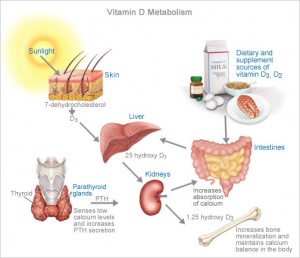 2. Download your D. Ideally, we get our vitamin D from the sun. Oddly, however, the majority of the world’s population is not getting enough of it these days. Vitamin D ensures better calcium absorption, Ensure your vitamin D blood levels are adequate via a blood test. If not, try sun therapy (regular, safe doses of the sun without sunscreen at peak hours). If that doesn’t work, consider supplementing until your blood levels are up to par.
2. Download your D. Ideally, we get our vitamin D from the sun. Oddly, however, the majority of the world’s population is not getting enough of it these days. Vitamin D ensures better calcium absorption, Ensure your vitamin D blood levels are adequate via a blood test. If not, try sun therapy (regular, safe doses of the sun without sunscreen at peak hours). If that doesn’t work, consider supplementing until your blood levels are up to par.
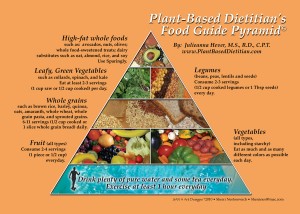 3. Alkalize your diet. Alkalizing your diet may support a healthy environment for your bones. This means eating ample servings of fruits and vegetables, herbs, vinegars, and “pseudograins” (e.g. buckwheat, quinoa, wild rice) as a foundation of your diet. Fruits and vegetables themselves have been shown to have positive effects on bone metabolism because of their overall high content of potassium and vitamin C.
3. Alkalize your diet. Alkalizing your diet may support a healthy environment for your bones. This means eating ample servings of fruits and vegetables, herbs, vinegars, and “pseudograins” (e.g. buckwheat, quinoa, wild rice) as a foundation of your diet. Fruits and vegetables themselves have been shown to have positive effects on bone metabolism because of their overall high content of potassium and vitamin C.
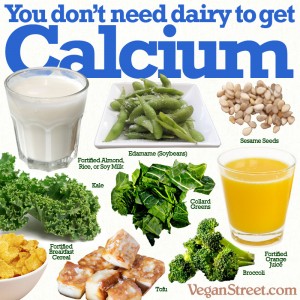 4. Consume adequate calcium from plant sources. Yes, dairy contains calcium. However, remember that you can consume calcium until the cows come home (no pun intended), but what matters most is how much calcium is actually absorbed. Excellent plant sources include leafy green veggies such as bok choy, kale, broccoli, napa cabbage, and watercress, calcium-set tofu, dried figs, sesame seeds and tahini, tempeh, almonds and almond butter, oranges, beans, and fortified plant milks and orange juice.
4. Consume adequate calcium from plant sources. Yes, dairy contains calcium. However, remember that you can consume calcium until the cows come home (no pun intended), but what matters most is how much calcium is actually absorbed. Excellent plant sources include leafy green veggies such as bok choy, kale, broccoli, napa cabbage, and watercress, calcium-set tofu, dried figs, sesame seeds and tahini, tempeh, almonds and almond butter, oranges, beans, and fortified plant milks and orange juice.
 5. Avoid processed foods. Processed foods – especially sodas and sugars – promote poor bone mineralization. Besides impacting bones directly, crowding out nutrient-dense, whole plant foods for nutrient-poor processed foods increases the potential damage. Stick to a minimally processed diet based on vegetables, fruits, legumes, whole grains, nuts, seeds, herbs, and spices to achieve nutrient requirements and reduce your risk for chronic diseases, including osteoporosis.
5. Avoid processed foods. Processed foods – especially sodas and sugars – promote poor bone mineralization. Besides impacting bones directly, crowding out nutrient-dense, whole plant foods for nutrient-poor processed foods increases the potential damage. Stick to a minimally processed diet based on vegetables, fruits, legumes, whole grains, nuts, seeds, herbs, and spices to achieve nutrient requirements and reduce your risk for chronic diseases, including osteoporosis.
Resources:
Bone nutrients for vegetarians
Dietitian Perspectives on Protein, Calcium and Vegan Bone Health
The Alkaline Diet: Is There Evidence That an Alkaline pH Diet Benefits Health?
[/fusion_builder_column][/fusion_builder_row][/fusion_builder_container]




This Post Has One Comment
I have been an accute asthmatic all my life and have never drank milk becuase of it. Not to say I have never tasted it, but I knew better than to drink it due to the repricussions. I find it interesting to see that even as a child my body knew what it needed. How many 8 year olds like brussle sprouts and artichokes? I could not be happier with my almod milk but have cows milk as my older kids are still weaning off from what society has set as a norm. I love your site. Helpful information for us, and my research paper too!!